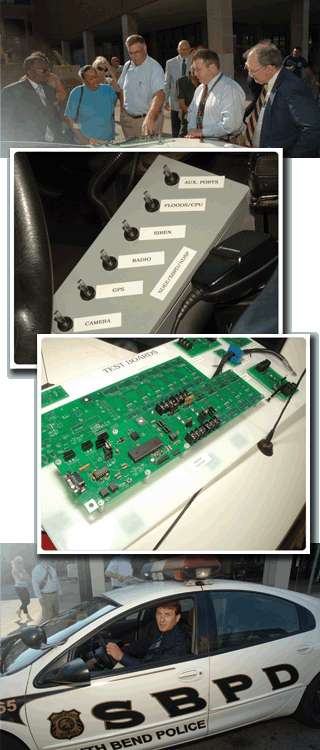Battery
Drain
It is hard to “serve and protect” when your police
car won’t even start. According to the South Bend Police
Department, the crime- fighting tools carried in squad cars, many
of which are electronic devices, can drain a vehicle’s battery
so much that it can’t start. And, it’s not just a local
problem; police departments across the country are facing a similar
challenge.
In addition to the normal electronic devices
in a vehicle, police cars also carry a laptop computer, video camera,
alarm system, a Global Positioning System, and at least one radio.Batteries
that typically last for five years are dying within two,
which is a safety issue
and drain on a department’s budget.
But police cars are not the only vehicles affected. Recreational
vehicles and many commercial vehicles (delivery and service trucks)
face similar issues.
Not to worry. Students in the Department of Electrical
Engineering may be close to a solution. As part of their senior
capstone project, 2007
graduates Jason Kulick,
Michael Gerardi, Martin Nguyen, and Peter
VanLoon developed a device that could
monitor and record information about the electrical currents in
a vehicle ... as well as control them. According to Mike
Schafer, the faculty member who teaches the
senior design course, the students’ invention
will automatically turn off devices in vehicle when the battery
power gets low.
A prototype device was developed and presented to the police department
and the City Safety Board in July. Although more testing will be
conducted by another senior design team, it is possible that a
commercially viable product could be available within a year, benefitting
police departments across the country.
Editor’s note: Because of its potential commercial application,
the design and related business concept for the students’ device
recently won first place in the Four Horseman Engineering Entrepreneurship
Program’s “Engineering Ideas Contest.” The students
have also made it into the business plan round of the McCloskey
Business Plan Competition, sponsored by the University’s
Gigot Center for Entrepreneurial Studies. Winners will be announced
in April 2008. |

Top photo: In July 2007, Mike Schafer, middle, and students (not pictured
above) presented a prototype of the Notre Dame battery monitor
and control device to members of South Bend’s City Safety
Board. Middle photos: The device was designed by undergraduates
in the Department of Electrical Engineering as part of their senior
capstone project. It monitors several electronic items in vehicles.
Bottom photo: Jason Kulick gets ready to demonstrate how the prototype
works in a police car. |


